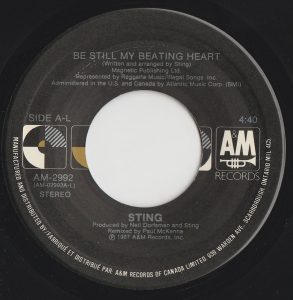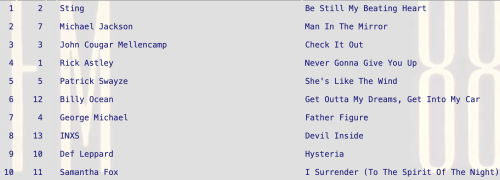#17: Be Still My Beating Heart by Sting
City: Montreal, PQ
Radio Station: CKOI
Peak Month: March 1988
Peak Position in Montreal ~ #1
Peak position in Vancouver ~ #28
Peak Position on Billboard Hot 100 ~ #15
YouTube: “Be Still My Beating Heart”
Lyrics: “Be Still My Beating Heart”
Gordon Matthew Thomas Sumner was born in Wallsend on Tyne, North Tyneside, Northumberland, England, in 1951. His mother was a hairdresser and his father was a milkman and engineer. When he was ten-years-old, young Sumner got introduced to Spanish guitar, when a family friend left it at the Sumner residence. After high school he was variously a bus conductor, building labourer and tax officer. He went to college and from 1974-76 was a public school teacher. Sumner performed jazz in the evening, weekends and during breaks from college and teaching, playing with the Phoenix Jazzmen, Newcastle Big Band, and Last Exit. He gained his nickname, “Sting,” due to his habit of wearing a black and yellow sweater with hooped stripes with the Phoenix Jazzmen. Bandleader Gordon Solomon thought Sumner looked like a bee which prompted the name “Sting.” According to Sting, in an interview with CBS Sunday Morning, “they thought I looked like a wasp, and they’d joke. They called me Sting. They thought it was hilarious…That became my name.”
In January 1977, Sting moved from Newcastle to London. It was in London that he met up with Steward Copeland and Henry Padovani to form the Police. (Padovani was replaced by Andy Summers at the end of August 1977). In 1979 the Police had a hit single about a man who falls in love with a prostitute titled “Roxanne”. The song climbed to #1 in Montreal and #8 in New Zealand.
In 1981 the Police won a Grammy Award for Best Rock Instrumental Performance with “Reggatta de Blanc”. They were winners of the same Grammy Award the following year for “Behind My Camel”. In addition in 1982, the Police won a second Grammy Award with “Don’t Stand So Close To Me” in the category for Best Rock Performance by a Duo or Group with Vocal. (Another hit single from the album was “De Do Do Do, De Da Da Da”). In 1984, the that category, the Police won a Grammy Award for Synchronicity. While in the category for Best Pop Performance by a Duo or Group with Vocal, the Police won a Grammy Award in 1984 for “Every Breath You Take”. The song was also nominated for a Grammy Award in the Record of the Year category, but lost to “Beat It” by Michael Jackson. While Synchronicity lost the Grammy Award to Thriller by Michael Jackson that same year in the Album oof the Year category. Then in 1986 the Police received a Grammy Award nomination for Best Music Video, Long Form for The Police Synchronicity Concert. But they lost to Huey Lewis and the News Huey Lewis & The News: The Heart of Rock ‘n Roll.
Subsequently, the Police enjoyed hits from Ghost in the Machine with “Every Little Thing She Does Is Magic”, “Invisible Sun” and “Spirits In The Material World”. They released Synchronicity, which included the international number-one hit single “Every Breath You Take”, and the international Top Ten hits “Wrapped Around Your Finger” and “King Of Pain”.
According to Sting, appearing in the documentary Last Play at Shea, he decided to leave the Police while onstage during a concert of 18 August 1983 at Shea Stadium in New York City because he felt that playing that venue was “[Mount] Everest.”
In June 1985 Sting released his debut solo album The Dream of the Blue Turtles. His debut single release from the album, “If You Love Somebody Set Them Free”, was a Top Ten hit in Canada, Italy, New Zealand and the USA. A second single release, “Love Is The Seventh Wave” reached #7 in the Netherlands, and the Top 20 in Belgium and the USA. A third single, “Fortress Around Your Heart”, charted to #8 on the Hot 100. the fourth single release from The Dream of the Blue Turtles, “Russians”, climbed to #1 in Italy, #2 in France, #4 in West Germany, and #7 in Belgium and the Netherlands.
The Dream of the Blue Turtles received Grammy Award nominations for Best Engineered Recording (won by Dire Straits), Best Jazz Instrumental Performance (won by Wynton Marsalis), Album of the Year (won by Phil Collins), and Best Male Pop Vocal Performance (won by Phil Collins). Sting also received a nomination for “Money For Nothing” recorded by Dire Straits (which he co-wrote with Mark Knopfler).
In the fall of 1987, Sting released his studio album …Nothing Like the Sun. From the album he released “We’ll Be Together”, a #4 hit in Italy and Top Ten hit in Canada and the USA. The second single release from the album was “Be Still My Beating Heart”.

Sting wrote “Be Still My Beating Heart”. In the liner notes to …Nothing Like the Sun, he wrote “Why does tradition locate our emotional center at the heart and not somewhere in the brain? Why is the most common image in popular music the broken heart? I don’t know… I do know that “Lazarus Heart” was a vivid nightmare that I wrote down and then fashioned into a song. A learned friend of mine informs me that it is the archetypical dream of the fisher king…can’t I do anything original?”
The lyrics depict someone whose dreams have been broken and shattered “like a falling glass.” He’s made promises before that were broken. Consequently, he ended up like “a fish caught on dry land,” or sinking “like a stone that’s been thrown in an ocean.” The singer knows what it’s like to feel physical attraction (or even embarrassment) when “the blood runs so red to my face,” when he gets excited and his heart beats so fast. The matters of the heart have led him to “every single book I know to soothe the thoughts that plague me so.” What he’s learned is that he’s got to find a way to stand his ground. Nonetheless, he finds “my logic has drowned in a sea of emotion.”
The lyrics exclaim: “Stop before you start,” meaning stop beating so fast once again, not stop beating period. How can the singer learn to move at the pace of guidance, and learn what the beating of his heart is communicating to him in the present moment? How can he pay attention to the messages of his heart without drowning in a sea of emotion?
“Be Still My Beating Heart” peaked at #1 in Montreal, #3 in Cleveland, and Philadelphia, #4 in Boston, #10 in Los Angeles, #3 in San Francisco, #6 in Portland (OR), #7 in Granite City (IL), and Detroit, #8 in Seattle, #9 in Buffalo, and #10 in Providence (RI). Internationally, “Be Still My Beating Heart” reached #15 on the Billboard Hot 100, and #22 in Canada.
Sting won two Grammy Awards for the music documentary Bring On the Night (Best Music Video, Long Form), and in Best Male Pop Vocal Performance. In 1989, …Nothing Like the Sun was nominated for Album of the Year (won by George Michael).
A third single from the album was “Englishman In New York”. In the composition, Sing told Guitar magazine, “One of my favorite little jokes is from an ‘Englishman In New York,’ where at one point we’re playing ‘God Save The Queen’ in a minor key. It really tickles me but nobody else hears it!” The song charted well in Sydney (NS), and peaked at #12 in Ireland, #13 in the Netherlands, and #16 in Belgium. A subsequent single, “Fragile”, shot to #11 in Belgium and #12 in the Netherlands.
In 1991 Sting released his third studio album, The Soul Cages, which won him a Grammy Award for the title track in the Best Rock Song category. The lead single, “All This Time”, became a Top Ten hit in Canada, Denmark, Finland, Italy, Norway, Portugal, and the USA.
In 1993 Sting released his album Ten Summoner’s Tales. The debut release from his album was “If I Ever Lose My Faith In You“. The single won Sting a Grammy Award for Best Male Pop Vocal Performance, and nominations for Record of the Year and Song of the Year. Soon after, his next single from the album was released titled “Fields of Gold”.
As well, in the 1990s Sting was heard in movie theaters singing a duet with Eric Clapton in 1992 titled “It’s Probably Me” in Lethal Weapon 3, and with Bryan Adams and Rod Stewart on “All For Love” in the soundtrack for The Three Musketeers. The song received a Grammy Award nomination for Best Pop Collaboration with Vocals. The single became the number-one song of the year in Canada in 1994, and also topped the weekly pop charts in over a dozen other countries in 1993-94. In the mid-90s, Sting released a Fields Of Gold: The Best of Sting.
In 1994, Sting’s fourth studio album Ten Summoner’s Tales won him Grammy Awards for Best Music Video (long form) and Best Engineered Album. He also received a third Grammy nomination for Album of the Year.
Sting had a last Top 20 hit in some international markets in 2000 with “Desert Rose” from his Brand New Day album. Sting has continued to chart his album releases into the Top Ten of album charts internationally. This includes Sacred Love (2003), Songs from the Labyrinth (2006), If on a Winter’s Night… (2009), Symphonicities (2010), The Last Ship (2013), 57th & 9th – in reference to an intersection in New York City near the studio where the album was being recorded (2016).
Of these, The Last Ship is the soundtrack from a musical with theater runs in 2014 in Chicago and on Broadway. The Broadway production received two Tony Award nominations for Best Original Score and Best Orchestrations. The 2020 production in the UK and Ireland featured Sting in the role of character Jackie White. The musical has also appeared in Germany, Norway, Finland, Canada and Denmark.
Sting collaborated with Shaggy on the album 44/876 which won the duo a Best Reggae Grammy Award in 2019. Sting’s more recent albums, My Songs (2019) and The Bridge (2021), have been international Top Ten hits in Europe, Asia and Australia. Over the years, Sting has received 17 Grammy Awards and been nominated on 37 occasions. Since he went solo in 1984, Sting has released fifteen studio albums.
Since 1979, Sting has performed in seventeen films. As well, Sting has appeared as himself in several dozen screen productions (TV and film). Most recently, in 2023 he appeared in the French film The Book of Solutions.
July 11, 2025
Ray McGinnis
References:
Sting, “How I Started Writing Songs Again,” TED Talks, November 20, 2016.
Glen Gamboa, “‘Last Play at Shea’ documentary tells stadium’s story,” Newsday, April 20, 2010.
Kristine McKenna, “Sting: The Rolling Stone Interview,” Rolling Stone, September 1, 1983.
Elizabeth Day, “Interview: The Thing About Sting,” Guardian, September 25, 2011.
Chris Neal, “Man In Motion,” Music & Musicians, February 17, 2011.
Nick Clark, “Sting to join cast of his own Broadway show The Last Ship,” The Independent, November 24, 2014.

CKOI 96.9-FM Montreal Top Ten | March 29, 1988

Leave a Reply